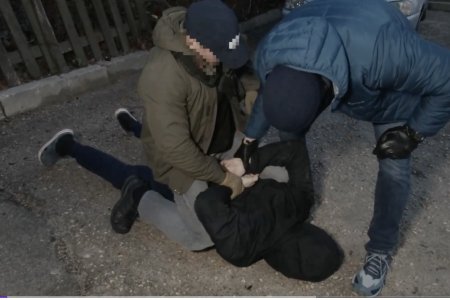
A Russian court has sentenced Stanislav Rudenko to ten years’ maximum-security imprisonment over the Ukrainian citizen’s donation of just £120 to help the ‘Azov’ Regiment defend Ukraine. This is the latest of several ‘trials’ of Ukrainians abducted from occupied territory, with questions arising about the level of surveillance used by the Russian invaders, as well as about possible set-ups aimed at hunting down patriotic Ukrainians.
The sentence was passed on 31 March 2025 by ‘judge’ Ilya Nikolaevich Bezgub from Russia’s Southern District Military Court in Rostov. The case was based solely on a politically motivated Russian supreme court ruling from 2 August 2022 claiming the Azov Regiment to be ‘a terrorist organization’. That extraordinary ruling was seen at the time as aimed at providing a mechanism for persecuting Ukrainian prisoners of war, and this has, indeed, proven to be the case. The ruling is, however, also being used to persecute Ukrainian civilians who try to help their own country defend itself against the aggressor state.
Any use by the occupying state of its legislation on occupied territory is illegal, but here the charge was also quite surreal. The donations to the Azov Regiment, seemingly to buy drones, were claimed to fall under Article 205.1 § 1.1 of Russia’s criminal code – ‘abetting terrorism’. Rudenko, who is from occupied Zaporizhzhia oblast, was alleged to have “shared the ideology of the banned terrorist organization ‘Azov’ and decided to aid members of the organization by financing their activities.”
On 13 November 2023, Rudenko was supposed to have found an appeal for money to buy drones, including for the Azov Regiment on an Internet channel. From then until July 2024, he had, allegedly, sent five thousand UAH or 120 USD to the Ukrainian bank account number indicated in the text, with the money to buy drones “in order to use them against the Russian armed forces” who had invaded, and are illegally occupying Rudenko’s home.
Finding Rudenko ‘guilty’ of this absurd charge, Bezgub passed a shocking 10-year sentence, with the first three years of this to be in a prison, the worst of Russian penal institutions and the remainder in a harsh-regime (maximum-security) prison colony.
It is unclear when Stanislav Rudenko was seized by the Russians, and how long he was held before they came up with such charges. Russia’s abduction of civilians became especially widespread after its full-scale invasion of Ukraine, and it is very likely that he was held incommunicado for some time and probably tortured before he was officially remanded in custody.
It is disturbingly unclear how such donations become known. One possibility is that Rudenko was first abducted, perhaps as a person known to have pro-Ukrainian views, and then charged later, after the FSB went through his phone and bank accounts, finding information about the donations. Other options are very sinister – for example, some degree of access to bank information or fake material about the donations needed, as a way of catching people trying to help Ukraine’s defenders.
This Is the first such ‘trial’ of a Ukrainian abducted from occupied Zaporizhzhia oblast, however Russia has already used the same or other, related, charges against very young Ukrainian men and women from Luhansk and Donetsk oblasts. Where a person has been forced to take Russian citizenship, s/h may also or instead be charged with ‘state treason’.
See:
Roman Hryhorian Ukrainian seized in Crimea and sentenced to 12 years for donations to Ukraine's defenders
Liudmyla Kolesnikova Russian FSB abduct Ukrainian from her mother’s funeral in occupied Crimea
Artem Kudzhanov (and his father Ibragim Kudzhanov) Russians abduct and torture father and teenage son from occupied Luhansk oblast
Ivan Semykoz Russia sentences Ukrainian to 8.5 years for donation as a teenager to Ukraine’s Azov Regiment
Danylo Yefimov 19-year-old from occupied Donbas sentenced to 12 years for donation for Ukrainian defenders
Kateryna Korovina Forced 'to wake up a foreign citizen in her own country’. Kateryna Korovina sentenced to 10 years for opposing Russia’s occupation



